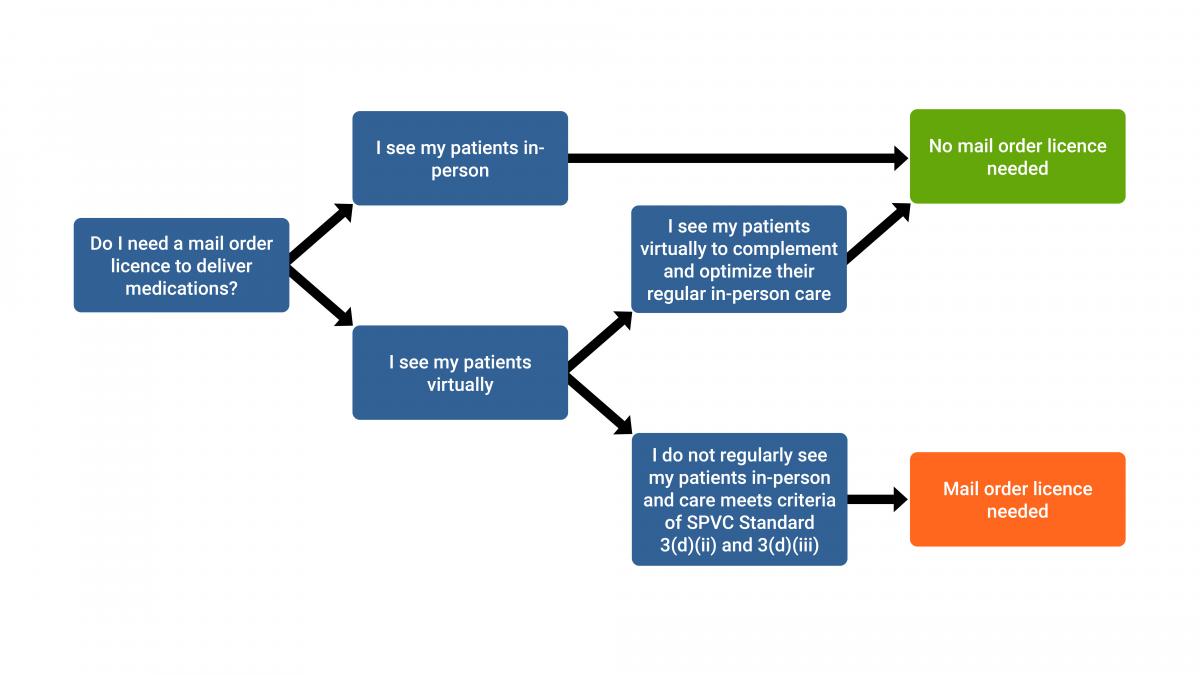
The standards referenced in the article below are out of date as of February 1, 2025. Please refer to ACP’s new standards for up-to-date information.
Community pharmacies may choose to deliver medications to patients for convenience and accessibility. Registrants regularly reach out to ACP to ask when a mail order licence is required as there is a perception that this licence category is needed when medications are delivered to patients. When pharmacies offer prescription delivery services, they must remember that it is not the act of delivery that matters, but whether the patient regularly receives in-person care. This consideration will determine if the pharmacy requires a mail order licence.
As described in the Standards of Practice for Virtual Care (SPVC), there are limited instances where patients will not routinely attend at the pharmacy for care. When these populations are served by the pharmacy, a mail order pharmacy licence is required.
The SPVC reflect the understanding that the ability of regulated members to routinely engage with patients, or their agents, in person is fundamental to the practice of pharmacy. Where in-person care is impossible or impractical, virtual care may be able to meet the needs of patients in remote or underserviced locations, as well as patients who are otherwise unable to obtain timely in-person care. These are the instances where a mail order pharmacy licence must be in place.
Considerations for delivery of medications for in-person care vs. virtual care
If patients regularly meet with the pharmacy team in person for assessments and to receive care, the pharmacy team may choose to deliver prescriptions and a mail order licence is not required because the patients receive in-person care.
If a regulated member provides restricted activities using virtual care to optimize and complement a patient’s regular in-person care, the pharmacy team may choose to deliver prescriptions, and this would also not require a mail order licence.
If a regulated member provides restricted activities using virtual care under Standard 3(d)(ii) and 3(d)(iii) of the SPVC to patients they do not see regularly in person, the pharmacy must have a mail order pharmacy licence.
Examples
The mode of delivery does not impact licensing requirements. For example, one pharmacy may choose to deliver medications through Canada Post and one pharmacy may choose to have a staff member drive the medication to the patient’s home. It does not matter how the medication is physically delivered to the patient. If the patient does not receive regular in-person care, in accordance with the SPVC, from the pharmacist either at the pharmacy or at another location, a mail order licence is required.
An in-person assessment does not need to be conducted at the pharmacy. For example, if a pharmacist visits a retirement complex to complete in-person assessments and delivers prescriptions based on those in-person assessments, the pharmacy would not require a mail order licence for this activity. In general, if a pharmacist assesses the patient in person, the pharmacy does not require a mail order pharmacy licence.
Ultimately, as illustrated in the figure below, when determining if a mail order licence is required, you need to consider how care is being delivered – virtually or in-person – as opposed to the mode of delivery of medications. If care is provided virtually, you then need to consider if you see the patient regularly in person or if care is almost always virtual. If you do not see your patients regularly in-person, assess your situation against the criteria described in Standard 3(d)(ii) and 3(d)(iii). If your practice aligns with the expectations within the SPVC, the pharmacy needs a mail order licence. If your practice does not meet the expectations described in the SPVC, whether you have a mail order licence or not, the services being provided need to be revised to ensure compliance with the SPVC.





